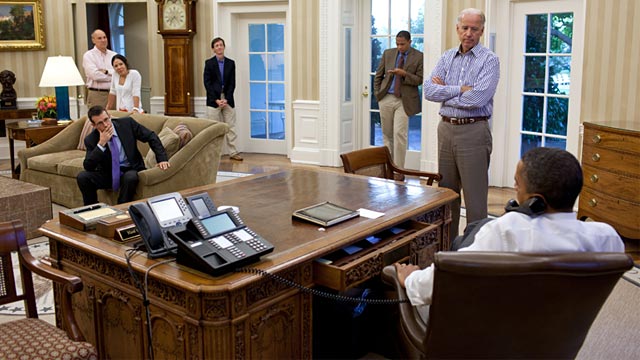
The US President Barack Obama has signed orders that would allow the U.S. to penalize key Russian industries.
WASHINGTON (AP) — The United States is working to convince a reluctant Europe of the need to punish Russia more severely for its meddling in Ukraine while at the same time warning Moscow to step back or take more financial hits.
It's a difficult balancing act for Europe, which wants to make Russia pay for its aggression but fears the economic turmoil from the fallout of new, harsher trade sanctions by the West.
Europe is Russia's largest trading partner and therefore has huge sway over Russia's shaky economy.
Economists say the U.S. risks appearing weak without support from Europe. But Europe is far from ready to levy penalties against Moscow that would undercut its own financial stability and possibly endanger its main source of energy.
President Barack Obama has signed orders that would allow the U.S. to penalize key Russian industries. European Union foreign ministers are set to meet Monday to decide what additional penalties to impose if Russia continues to ignore the West's warnings.
Assistant Secretary of State Victoria Nuland told a Senate panel this past week that U.S. and EU sanctions now in place are "biting" and "pinching" the Russian economy, "and we're now considering further measures."
Nuland said Moscow has spent an estimated $25 billion to bolster the ruble over the past five to six weeks since sanctions were introduced. Russia suffered more capital outflow in the first three months of 2014 than the $62.7 billon it lost for all of last year, she said.
"Russia is paying a very high price already for its actions, and that cost will go up if its pressure on Ukraine does not abate," Nuland said.
The next round probably will expand the list of high-ranking Russians whose Western assets have been frozen and are barred from traveling to the EU or U.S.
Last month, the EU took aim at 33 individuals and the U.S. 31. The U.S. also has barred American companies or individuals from doing business with Bank Rossiya, which has about $10 billion in assets and is owned by members of Russian President Vladimir Putin's inner circle.
The Treasury Department on Friday added seven Crimean separatists and a Crimea-based gas company, for undermining the government in Kiev, the capital.
U.S. moves against Russia's energy, metals and mining sectors also have been prepared in what Treasury Undersecretary David Cohen has called "a very powerful yet flexible tool that will allow us to respond quickly and meaningfully as events develop in Ukraine."
"We recognize that these measures will have the greatest impact when harmonized with the actions of our international partners, in particular Europe and Asia, because of their extensive economic ties to Russia," Cohen told a Senate Financial Services subcommittee this month.
In a sign of the tension in eastern Ukraine, home to a large Russian-speaking population, men in the uniforms of Ukraine's now-defunct riot police occupied police headquarters in Donetsk on Saturday, hours after armed men seized police headquarters in Slovyansk, about 55 miles away.
In Washington, the International Monetary Fund was wrapping up its spring meetings Saturday, with its board expected to approve by early May a $14 billion to $18 billion loan package to help Ukraine avoid a financial collapse.
Treasury Secretary Jacob Lew insisted late Friday that there was strong support for harsher penalties, saying Western allies "stand together in asking Russia to step back."
The EU's leverage against Russia is greater than America's because of the EU's close commercial and financial links with Moscow, including energy pipelines that pass directly through Ukraine.
Europe is Russia's largest trading partner. It buys more than three-quarters of Russia's crude oil and natural gas exports, which fund about half the government budget.
Any fresh sanctions by the EU must be approved by unanimous vote among its 28 member nations.
Putin has mocked the current sanctions and on Thursday warned 18 European leaders that their gas supplies were in danger.
Nonetheless, Russia apparently is wary of antagonizing the EU too much, so it has decided to retaliate against Washington but not the EU so far.
While the sanctions have given Russia little pause, Europe could find other ways to use their trade leverage against Moscow.
Konstanty Gebert, an analyst with the European Council on Foreign Relations, said Europe could issue trade embargoes against Crimea, similar to ones targeting Israeli companies that do business in the West Bank.
He said Europe could help give court access to Ukrainians who are looking to sue Russia for lost or damaged property as a result of its annexation to the Black Sea peninsula.
"The situation calls for slightly more creative thinking and looking at sanctions which instead of looking like a sledgehammer can be more modest but more aggravating," Gebert said.

The Obama administration has tried to present a unified front with Europe and does not want to go after Russian trade alone. But the idea of tougher penalties faces opposition from within the U.S. as well.
Barring American companies from dealing with Russia could clear the way for global competitors to grab a larger market share, especially if Europe does not impose its own sanctions against Moscow. It could take years for U.S. businesses to regain a foothold in Russia trade once the crisis has passed and sanctions end.
The Obama administration understands the financial pain that tougher sanctions would bring to the global economy, not just Russia.
Still, pulling back would amount to an admission that there is only so much the West can do to pressure Putin against deeper incursions into Ukraine, especially since few, if any, nations now are willing to act military against Russia.
"Unless the European Union plays along, the reality is that anything the U.S. does will have a very limited impact," said economist Eswar Prasad, a professor at Cornell University, who formerly worked for the International Monetary Fund.

No comments:
Post a Comment